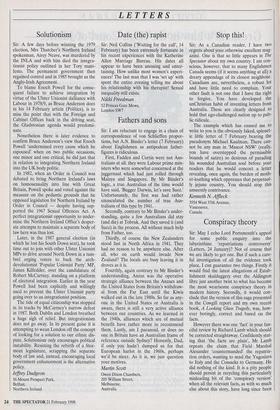LETTERS Solutionism
.Sir: A few days before winning the 1979 election, Mrs Thatcher's Northern Ireland spokesman, Airey Neave, was murdered by the INLA and with him died the integra- tionist policy outlined in her Tory mani- festo. The permanent government then regained control and in 1985 brought us the Anglo-Irish Agreement.
To blame Enoch Powell for the conse- quent failure to achieve integration by virtue of the Ulster Unionist dalliance with Labour in 1978/9, as Bruce Anderson does in his 14 February article (Politics), is to miss the point that with the Foreign and Cabinet Offices back in the driving seat, the Gladstonian agenda would predomi- nate.
Nonetheless there is later evidence to confirm Bruce Anderson's view that Enoch Powell 'undermined every cause which he espoused' when on two public occasions, one minor and one critical, he did just that in relation to integrating Northern Ireland into the UK body politic.
In 1982, when an Order in Council was debated to bring Northern Ireland's laws on homosexuality into line with Great Britain, Powell spoke and voted against the measure on the pedantic grounds that he opposed legislation for Northern Ireland by Order in Council — despite having sup- ported the 1967 Sexual Offences Act. A perfect integrationist opportunity to under- mine the Northern Ireland Office's desper- ate attempts to maintain a separate body of law here was thus lost.
Later, in the 1987 general election (in which he lost his South Down seat), he took time out to join with other Ulster Unionist MPs to drive around North Down in a tum- brel urging voters to back the arch- devolutionist 'Popular Unionist Party' MP, James Kilfedder, over the candidature of Robert McCartney, standing on a platform of electoral integration. Earlier in the year Powell had been explicitly and willingly used to prevent the Ulster Unionist party going over to an integrationist position.
The tide of equal citizenship was stopped in its tracks by McCartney's narrow defeat in 1987. Both Dublin and London breathed a huge sigh of relief. But integrationism does not go away. In its present guise it is attempting to wean London off the concept of looking for a solution to our ethnic dis- pute. Solutionism only encourages political instability. Resisting the rebirth of a Stor- mont legislature, scrapping the separate body of law and, instead, encouraging local government enhancement is the alternative policy.
Jeffrey Dudgeon
56 Mount Prospect Park, Belfast, Northern Ireland


























































 Previous page
Previous page